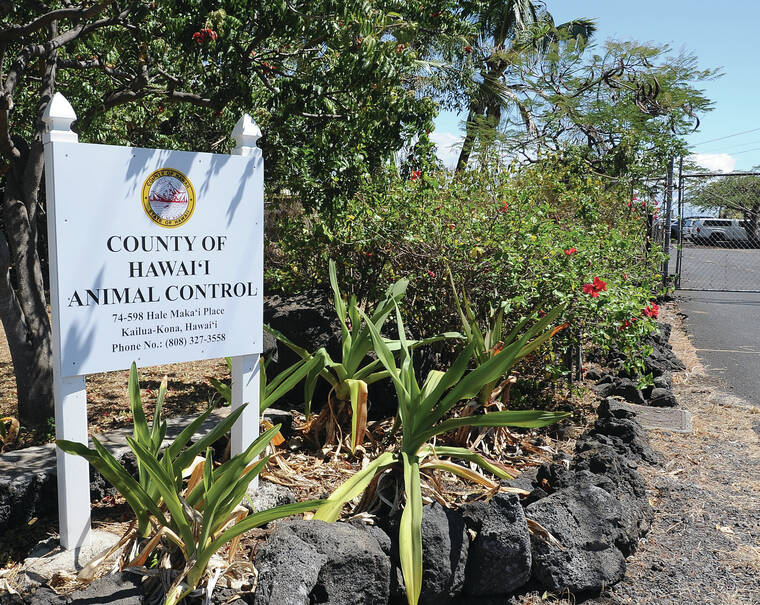A bill creating an Animal Control and Protection Agency in Hawaii County is headed to the full County Council for consideration.
The nine-member Committee on Governmental Operations and External Affairs on Tuesday voted unanimously to forward Bill 22 with a favorable recommendation to the council for further consideration following a lengthy discussion with officials and hearing from a number of testifiers.
The proposal to create the agency within the county’s executive branch comes as the Hawaii Police Department nears the end of a second year overseeing animal control services under a pilot program that began in July 2021.
The police department assumed the duties after the county terminated its contract with Hawaii Rainbow Rangers in the wake of a litany of concerns. The rangers took over animal control services after long-time contract holder Hawaii Island Humane Society declined to bid for the contract in 2020.
“The impetus for this bill is an understanding after having managed animal control for ourselves under HPD that it really needs a dedicated agency to really perform the core services that are required under statute and County Code,” said Hamakua Council member Heather Kimball, who co-introduced the measure with Kohala Council member Cindy Evans.
The agency, as proposed, would comprise an “animal control and protection administrator” and necessary staff, all under the direct supervision of the county managing director. No animal-related policies are addressed by the measure.
The goal is to have animal control services out of the police department by the start of the next fiscal year on July 1, but doing so meant getting the bill through Tuesday’s committee hearing as well as two readings before the County Council to ensure the agency is included in the fiscal year 2023-24 budget that’ll come out March 1.
Puna Council member Matt Kanealii-Kleinfelder raised several issues, including that the cost of animal control in the county has risen over the years, asking Finance Director Deanna Sako whether that cost will continue to grow under a new agency. The county currently allocates $2 million for animal control services in the police department, which would be transferred to the agency.
“Whether we keep it as part of police or make it a separate agency, the costs are going to grow,” said Sako. “I think that is just what we’re finding: the cost of dog food, if we can even get it, vet bills — costs are constantly going up.”
Hilo Council member Sue Lee Loy later said before the vote that she would submit a request for a fiscal impact statement to provide the full council an estimate of the effect creating the new agency would have on county revenues, expenditures, taxes, and fiscal liabilities.
Ten people offered testimony during Tuesday’s meeting, some presenting concerns and suggestions and others speaking simply in support of Bill 22. Much of the testimony was related to animal-related policies and updating Hawaii County Code, however.
Lauren Fu, a founding member of Hawaii Island Pets Alive, said she “conditionally” supports the measure, and like others who testified, offered suggestions to addressing Hawaii County’s animal issues.
Among them was urging the panel to revise the County Code before creating a new agency.
“Chapter 4, as it stands, need substantial revision to be considered up-to-date and modern code. We strongly recommend a comprehensive review with outside expertise,” she said.
Sylvia Dolena, an animal advocate, added the county is “putting the cart before the horse.”
“We understand that Bill 22 is to create the agency, however, with archaic, inhumane laws on the books, which are not necessarily enforced, not effective, putting a new agency into an old paradigm will render it ineffective. Hawaii County laws are in the Dark Ages, and well below national standards,” she said. “The agency first needs a solid foundation of responsibility, services, new and effective laws and certified, experienced animal protection officers otherwise it will be business as usual. Let’s get the laws changed first, then design a new organization with a set of responsibilities and functions that will take us into the future.”
Testifiers also urged the inclusion of an oversight committee comprising members of the community, as well as for the measure to establish defined objectives with transparency in recording and operations.
“We’re asking for a clearly written document that articulates the areas of responsibilities and description of services to be provided to the public in exchange for taxpayer dollars,” Fu said.
Kimball Tuesday repeated her vow to work with Evans and the community on updating the County Code, as well as to establish an advisory committee of some form that would not require adherence to Sunshine Laws right away.
“We may want to give them a little time to get their feet wet and get set up before we do something that would require Sunshine Law provisions, although there’s always the opportunity to set up something informal as an advisory committee that would include members of the community,” Kimball said.
Kristen Alice, offering testimony in support of Bill 22 on behalf of HOPE Services and herself, recounted recently having to find a new home that would accept her two small dogs, a situation she said is “pretty common” on the island.
“It was hard. I was getting worried. I was scared I would have no place to go and fortunately at the last minute, I was able to find somewhere that would accept my two dogs,” Alice said. “But many others are not so lucky and this is what happens with a housing crisis. It’s not just people that are affected — animals are the unheard victims of this crisis. When people get priced out of their homes and landlords choose not to allow pets, those pets might have nowhere to go. Nobody should be forced to choose between housing and risking the euthanization of their best friend or abandoning their best friend or having to give them up.”
Establishing the Animal Control and Protection Agency, would be “a first step toward protecting the animal victims of the housing crisis and also by removing it from police we would let them focus on public safety rather than animal control.”
She further suggested allocating a portion of taxes from second homes valued at over $2 million to animal control. It’s estimated the home tax will provide an additional $10 million in revenue for the county annually.
“Seventy-five-percent of this is going to homeless services but perhaps you could consider designating the remaining 25% to offset the costs of this and to create a sustained funding source so that they know there’s also funding coming in,” Alice said.









